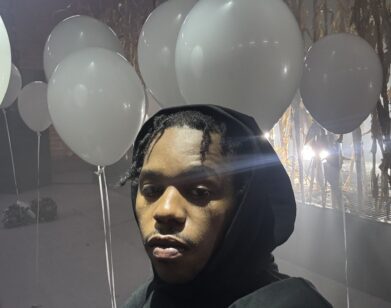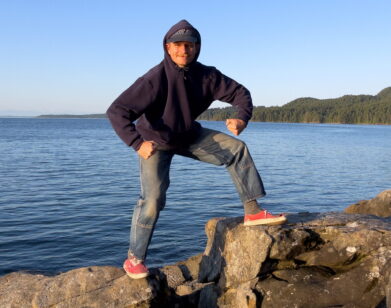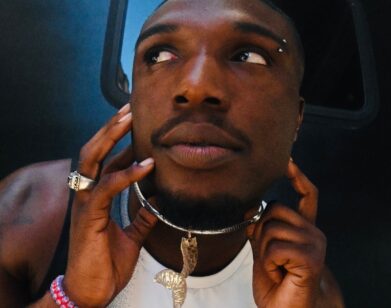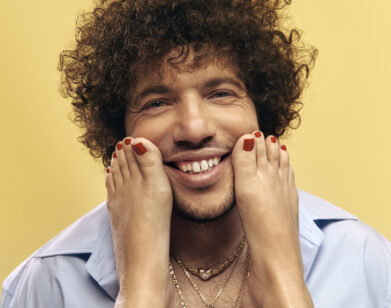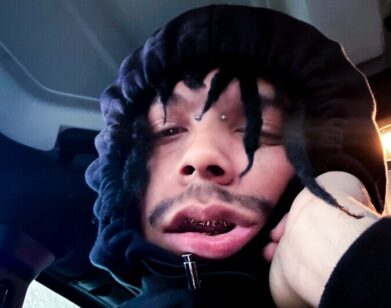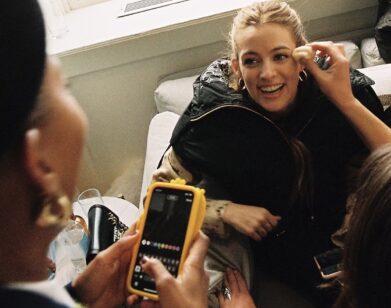LA Priest’s GENE Is a Moody Jaunt Through the Welsh Wilderness
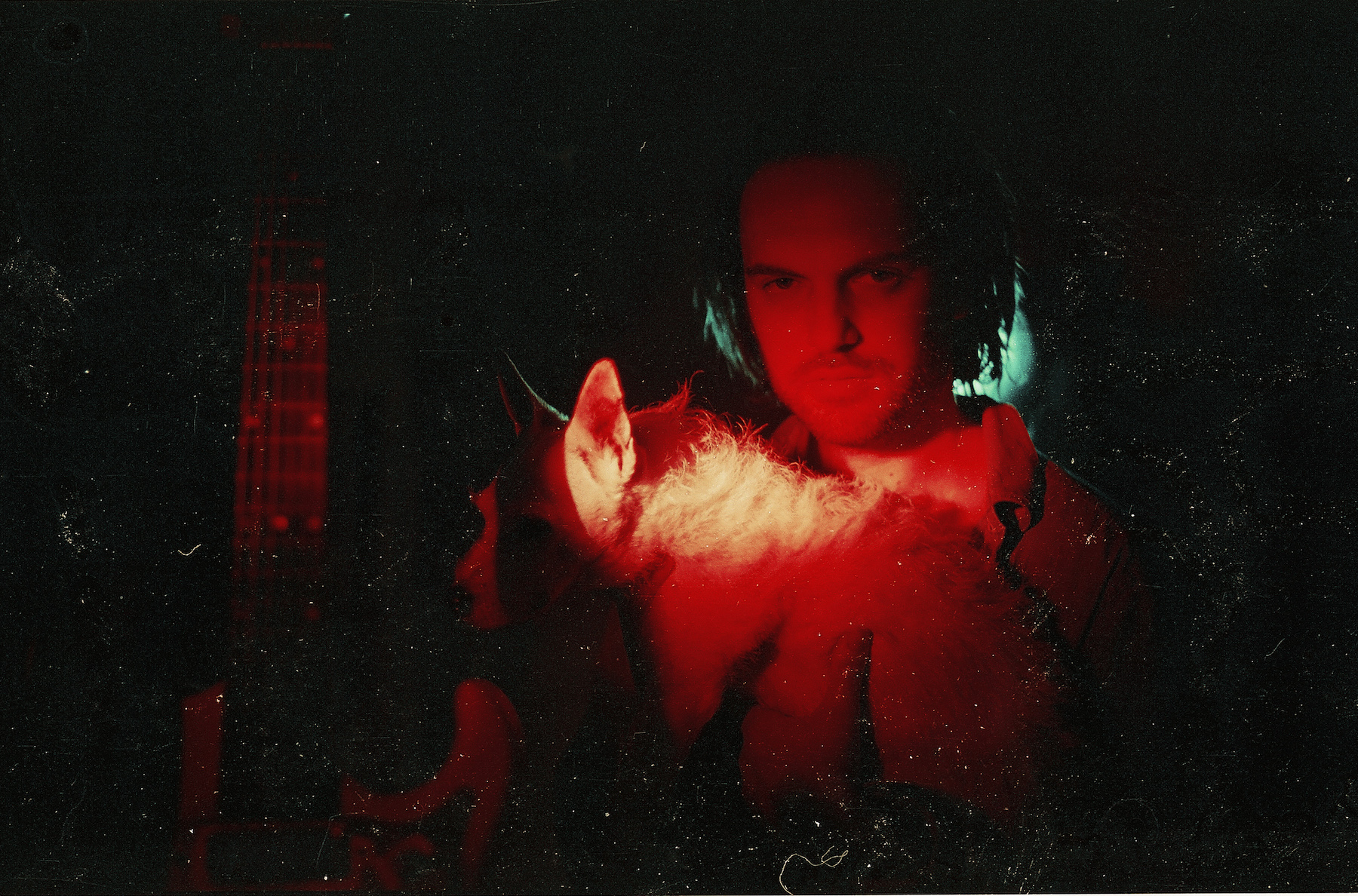
Photo by Isaac Eastgate.
This is “Add to Queue,” our attempt to sort through the cacophony of music floating in the algorithmic atmosphere by consulting the experts themselves. Our favorite musicians tell us about their favorite music—the sad, the happy, the dinner party-y, the songs they want played at their funeral.
“I’ve never been onboard with the whole city thing,” says Sam Eastgate, the psych-pop musician who goes by the somewhat misleading moniker LA Priest. “I lived in a town once, but it was a small one.” This pronounced disinterest in city living is a surprise coming from someone who appears to have named himself after the second largest city in the United States. It’s even more surprising to fans of Inji, the artist’s 2015 debut album, which encapsulates every facet of a rollicking, acid-fueled night on the town. From the warped funhouse vocals on “A Good Sign” to the smoldering union of bass and synth on “Occasion,” LA Priest’s eerie lyrics and distorted funk instrumentation bring to mind big skylines and seedy underbellies rather than cozy hamlets and dirt roads. But according to the artist himself, it’s all just a simple misunderstanding.
Eastgate appears on the cover of Inji, his first album as LA Priest, in an open silk shirt with a gold pendant, a morose dog hanging off his lap. With this image as a starting point, it’s easy to imagine the artist’s alter ego as a character of questionable morals bumping elbows with would be-actors somewhere along the Sunset Strip. But Eastgate himself lives a wholesome existence, surrounded by flocks of sheep in a remote Welsh village with his wife.
Eastgate hasn’t had a big night out in a while, and he hasn’t released new music since 2016’s Soft Hair, a one-album project with Connan Mockasin that became an instant cult favorite. But the desolate Welsh surroundings provide ample opportunity for reflection and experimentation, and this month’s GENE is the lovechild of both. The album, named after an analog drum machine that Eastgate invented and built by hand with a soldering iron, is wide-open and meandering, a perfect balmy weather salve for stifling times.
In honor of GENE, we spoke with Eastgate to discuss the album and everything behind it. From typing “background music” into Spotify to grocery shopping backstage at his own concerts, LA Priest tells us how he gets it done.
———
MARA VEITCH: Tell me about your village.
SAM EASTGATE: I live in probably the least populated part of the U.K., in an isolated part of Wales just across the border from England. It’s a different world. Full of sheep, and that’s about it.
VEITCH: Were you ever a city dweller?
EASTGATE: I wasn’t ever a city person, actually. That was definitely a big issue when I was starting to make music where I grew up. Everyone my age left Nottingham for London. Eventually I just decided that basically anyone who stays behind is going to be in my band.
VEITCH: How did you end up naming yourself after one of the biggest American cities?
EASTGATE: [Laughs] I settled on the name when I was 15. My best friend’s kitchen was the local hangout for the youths in our village, and every night you’d have, like, ten teenagers sitting around the kitchen table getting drunk or high or whatever. I had a little dictaphone that I used to bring everywhere, and I would just record conversations. We used to go around the table and each kid would say the most outrageous thing that came into our heads. At that age, the more random a thing you’d say, the more hilarious it would be. Actually, maybe that’s just how it is when you’re high. One time I said “la priest”—not L.A. priest—and someone said it would be an amazing band name. I was like, “Well its mine!” From then on, all the music that I put on the internet was under the name LA PRIEST. In capitals. I was like, “Look at all these losers with their lowercase band names.” But because of the caps, people thought it was LA Priest, like the city, and when I finally got a record deal, maybe eight years later, the label executives said, “You have to be LA Priest, it’s way cooler.”
VEITCH: So your whole origin story is based on a misunderstanding?
EASTGATE: It is. [Laughs] It’s kind of great though, because LA Priest comes with a whole persona. There’s a seedy connotation to it, like some Hollywood Elvis impersonator. I wouldn’t google “LA Priest” if I were you—the results are bleak. Loads of sex scandals and dodgy stuff. But I’m the good LA priest. I’m not like the rest of them.
VEITCH: The cover art for your last album suggests otherwise, I have to say.
EASTGATE: Well, you can thank my dog for that. I get a lot of heat about it, because people are kind of hot on animal rights. The photo was taken in this horrible room I was renting at the time, with all this creepy stained wallpaper peeling off the walls. My brother and I taped up my white bed sheets to make it less grim. But I was just posing, and my dog jumped on my lap and wouldn’t move. She does it in music videos too, it’s the strangest thing. She knows where the camera’s pointed, and she walks right into the middle of the shot.
VEITCH: She’s a natural. What was the last song you listened to?
EASTGATE: It was a nice sunny day today, and my wife was just blasting Bruce Springsteen’s “I’m on Fire” with all the doors and windows open.
VEITCH: Who was the first musician to influence you?
EASTGATE: I was obsessed with the Beastie Boys when I was 12. It was typical white Northern U.K. isolation; we’d never heard any of the music that the Beastie Boys were referencing. You could’ve told me that those guys invented rap, and I would have believed it. I never even heard rap music until years later, when I discovered Run-D.M.C. and the other early hip-hop artists that had influenced the Beastie Boys.
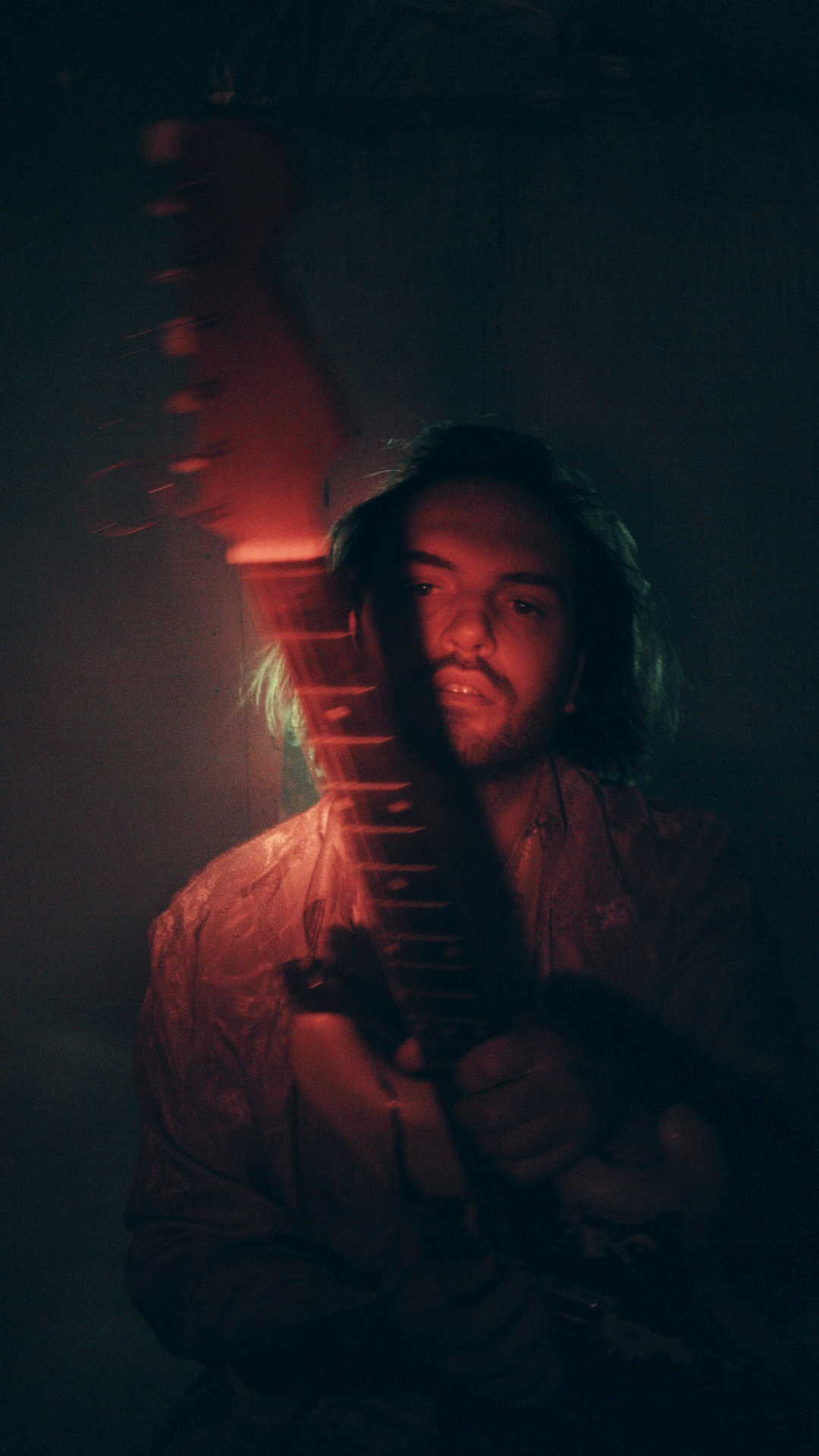
Photo by Isaac Eastgate.
VEITCH: What was the first concert that you attended?
EASTGATE: It was a band called Whirlwind Heat. It was a great first gig. I haven’t heard much from them in the last few years. Black Wire opened for them, they were a Leeds electropunk outfit, and The Grips, who were a thrash situation. Everybody’s first live gig is probably like this, but for me that first show was like, “Oh, okay. This is what live music is supposed to be about.”
VEITCH: Do you have a favorite movie soundtrack?
EASTGATE: I think it’s got to be Queen’s soundtrack for Flash Gordon. I’ve watched that film so many times, just for the music.
VEITCH: Who’s your dream collaborator?
EASTGATE: The collaborations I’ve enjoyed most in the past are with artists whose work is completely different from mine, who bring something that I’d never think of to a project. I’d love to work with a classically trained musician who can write sheet music, so I’ll say Mozart.
VEITCH: What’s a song that always puts you in a good mood?
EASTGATE: “Yellow Mealie Mealie” by Lumumba. It’s kind of a sad song actually, but it has such a beautiful melody. It starts with this synthetic flute solo that feels straight out of a Disney movie. The title is a reference to sweet corn. My wife is South African, and she showed me this one. One other that puts me in a great mood is called “This Place is Boring” by Lazarus Kgagudi, which always makes me laugh. It kills the mood, but it also really makes the mood.
VEITCH: If your life were a television show, what would be the theme song?
EASTGATE: The Grange Hill theme tune. That one also makes me happy. Maybe that doesn’t count, since it’s already a TV show theme song…
VEITCH: Do you have a favorite of your own songs?
EASTGATE: That’s tricky. Like all musicians, you just get tired of each song at some point. When I only had one album, I started to really dread playing live because I’d be like “aw man, I can’t play that one again.” But now I have the new album coming out and I’m so motivated to perform again. But one that never got old was “Fabby,” and I’m pretty into “Rubber Sky” off the new album.
VEITCH: What would you put on a road trip playlist?
EASTGATE: I should’ve prepared for this. I want to cheat, but I don’t use Spotify so I can’t look up my listening history. Okay, I know. A band called Woo has a record called It’s Cosy Inside; that’s a subtle gem that I found this year. I try to go through discographies in alphabetical order by year, and I’ve only gotten as far as 1980 this year. One in about every hundred songs you listen to ends up being interesting. That’s how I found Woo.
VEITCH: What if you were hosting a dinner party?
EASTGATE: Oh lord.
VEITCH: You’ve got this.
EASTGATE: Have I got this? Well, it depends on what we’re eating. Actually, no it doesn’t. I’d put on Queen no matter what. I won’t name any names, but one of my wife’s friends came over for dinner last week, and she typed in “background music” on Spotify. Literal background music, elevator music. I was in shock. It was like we were the main characters in her movie.
VEITCH: What if you were throwing a house party?
EASTGATE: I haven’t had a really crazy house party in a long time. You don’t really get those in Wales. But if I were throwing one, I’d put on some Neil Landstrumm, specifically his live set from House of God. That’s for a bit later in the night, though. I’m not really sure what situation calls for Neil, but I’m hoping my future house party is the perfect moment.
VEITCH: What if you were just crying in your bedroom?
EASTGATE: “Purple Rain,” or any Prince really.
VEITCH: I don’t know if you partake, but what would you put on if you were smoking?
EASTGATE: [Laughs] Can you believe I almost just said Bob Marley? How embarrassing. I used to listen to Exodus before I ever smoked weed, but I think I should just admit that I’d put on Bob Marley and some marijuana leaf sunglasses and just embrace it.
VEITCH: What would you want to play at your funeral?
EASTGATE: That’s a bit of a downer. Maybe Jamiroquai’s “Deeper Underground”—they can play that as they lower my casket. But if I die in Wales, there’s a strong tradition of singing funerals, so I’d want that. Since I wasn’t born here, I don’t know if they’d sing for me. They might be like, “Stick to Jamiroquai, you English bastard.” Maybe I’d go for something that confuses people, like Jimi Hendrix’s American National Anthem.
VEITCH: Do you have a go-to karaoke song?
EASTGATE: “What’s New Pussycat” by Tom Jones.
VEITCH: What items do you always ask for in your green room?
EASTGATE: Usually just avocados, but that was because my wife always asked me to bring them home.
VEITCH: Just getting your grocery shopping done at your concerts?
EASTGATE Exactly. My list is like, avocados, bread, milk, loo paper.
VEITCH: What do you want people to be doing while they listen to your music?
EASTGATE: When I started out, I used to just record it and never even imagined an audience. Then people started telling me they were blasting my music while they worked out, and that blew my mind. I think, though, that my music would be the perfect accompaniment to a diabolical science experiment.
VEITCH: Wow, I can see it. Do you sing in the shower?
EASTGATE: Yeah, except my shower hasn’t worked for a long time, so I can’t sing in there these days. I used to sing a lot of Bill Withers, Elvis, Roy Orbison, Buddy Holly—all the greats. I ought to get the shower fixed so I can get my career back on track. Thanks for that reminder.

